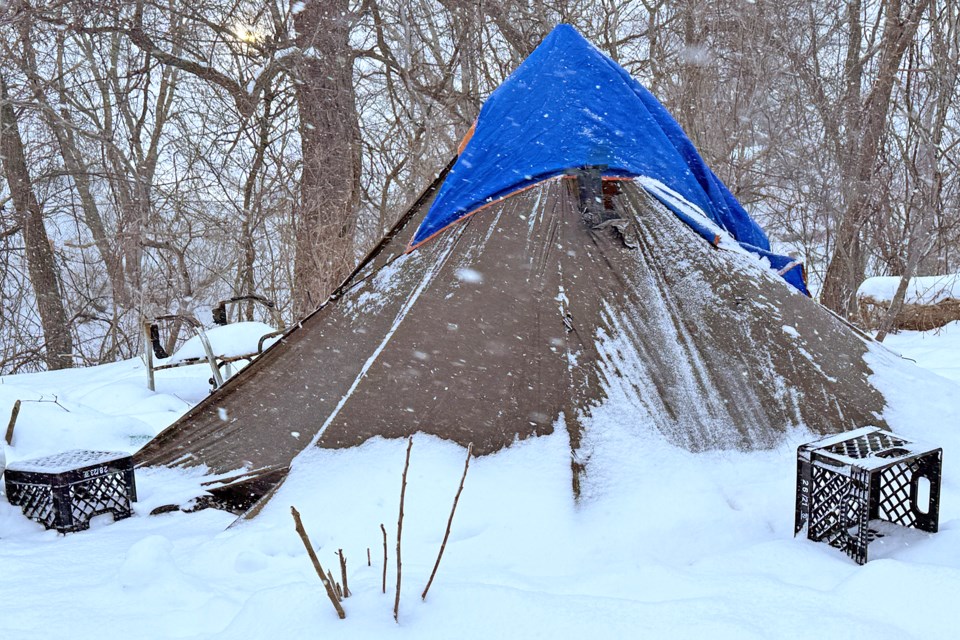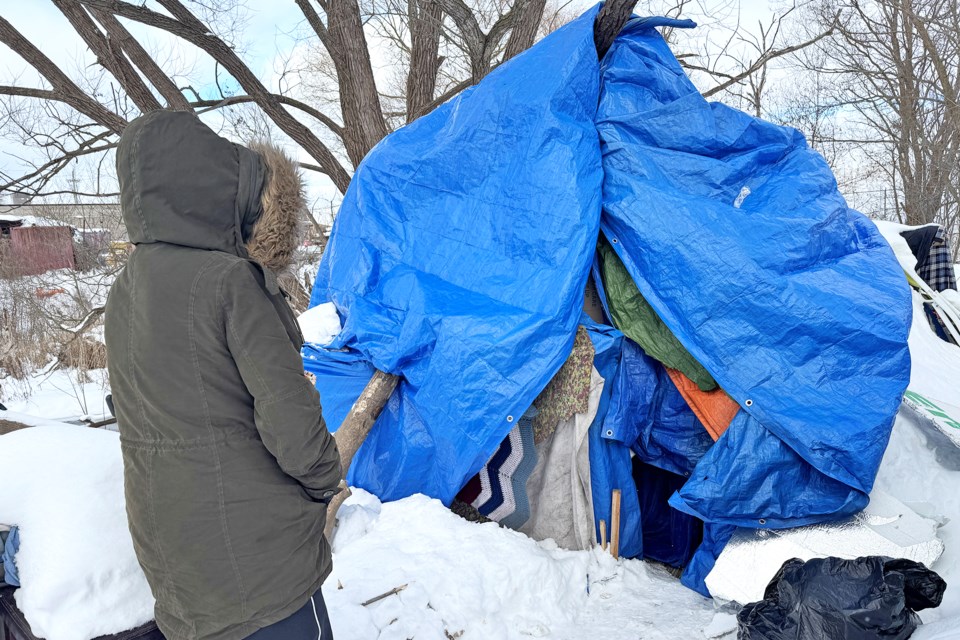With the current cold snap seeing the thermometer sinking down to nearly -20 degrees Celsius at night this week, the unhoused and unlucky in the city of Barrie are suffering immensely, and with little relief in the forecast.
Hundreds of people in Barrie are hunkered down in tents, makeshift wooden structures, flimsy tarps patched together, and sometimes nothing at all in the way of protective shelter.
Jeremy, a 30-something man with long hair and a bushy beard, has been calling Barrie’s Victoria Street area, just off Bradford Street and not far from the city’s downtown area, his home for the past few months.
He’s standing in the snow, looking down at what was once the tent he had been sleeping in, which has been crushed flat. His belongings are strewn about.
Jeremy is frustrated and cold.
“There’s no surviving out here, not unless you build a house,” he tells BarrieToday as he clutches a coffee in one hand, the only part of him that is warm at the moment.
“I put my body through hell. I just scream half the time just to stay active and keep my heartbeat going, loud and obnoxious, just to keep the blood pumping in my system.”
Down the street and around the corner, Colin, who says he’s 40, collects a few items from a volunteer who has dropped off clothing and blankets to the homeless residents eking out a life among the trees in their ramshackle shelters.
“Do you have any sleeping bags?” he timidly asks the woman with the vehicle full of items.
She smiles and nods, telling him “yes.”
“Oh, my god. I could really use one,” Colin stammers.
He’s stuck on disability benefits and says he cannot find any housing he can afford, even with sharing the costs with roommates.
Colin has lived on the street, off and on, for almost eight years.
The frigid temperatures of late have turned his life upside down.
“I don’t sleep at night. I don’t sleep at all, pretty much.”
Colin says he hasn’t had any kind of shelter of his own of late, not even a tent, until now.
To keep warm, he has been just walking around, keeping his body moving.
Frostbite has been an ongoing issue for Colin, and mainly with his feet.
“All I can do is change socks and try to keep dry,” he says.
‘Pretty bad’
Meanwhile, a short walk through the nearby woods finds Tanya, a small and frail-looking woman in her 40s, holding closed an oversized winter coat.
She lives under a blue plastic tarp in the snow, by herself.
Inside are old threadbare blankets on top of a wooden shipping pallet, which keeps her body off of the frozen ground.
Tanya’s sole heat source is just a canister with pure alcohol inside that she tries to light three times per night in a feeble attempt to generate some sort of heat.
But it doesn’t do much to beat back the cold, she says. And it’s dangerous. She keeps two big jugs of water nearby in case of fire, but says she hasn’t had to use it yet, thankfully.
“It’s enough to warm me up for a couple of minutes; then I’m frozen again,” Tanya says.
There has been more than one night when she has found herself frozen and stuck to the ground.
Tanya says she doesn’t get any sleep due to the frigid temperatures.
Frostbite is also taking a toll on her hands and feet, which she describes as “pretty bad.”
Tanya says her biggest struggles trying to survive outdoors in January are trying to keep the cold out, while also staying hydrated and not going hungry.
Keeping her clothes dry is a constant challenge for her.
Does she think she can stick it out until the end of winter like this?
“No. I’ll die. I know I will. It gets that cold,” Tanya says without hesitation.
It wasn’t always this bad for her.
Tanya says she was housed for a year up until last May, but she says the landlord wasn’t paying the mortgage, so she had to move out unexpectedly.
“It was me, my husband, my sister and her boyfriend,” she says.
They were scattered about after the eviction and she lost contact with her husband. Tanya doesn’t know where he currently is.
“I have no clue. I haven’t seen him since that day, basically,” she laments.
She is eating the remnants of a bagel and says she’s starving.
As for help from warming centres in the city?
“There are certain spots in town, but how do we get to those spots?” Tanya asks. “Some of us are so cold that we can’t even make it out of our sleeping bags, or whatever it may be.”
Leaving behind any of her belongings also risks certain theft, which is rampant within the homeless community.
Tanya says the Busby Centre and individual community members who visit to drop off food and supplies “help a lot.”

As for extreme cold-weather emergencies during the winter months, Barrie police say they continue to receive calls for service that involve people who may not have a place to stay or go.
“We will try to assist them by using permanent and a number of seasonal locations that are available at this time of year,” police communications co-ordinator Peter Leon told BarrieToday.
“We are very fortunate to have facilities operated by the city and also facilities that are supported by the County of Simcoe that can be called upon as needed.”
In situations when there is extreme cold, Leon said additional resources are often identified and made available to those who need them.
“A recent example of this is 445 Blake St., where the county, at their discretion, can initiate warming centre operations due to a weather event, wind chill and cold temperatures,” he said.
A representative of the County of Simcoe said there are various ways to access service during inclement weather, including the alternative space activation strategy where the current shelter system creates additional space in facilities to allow more people to come inside and stay warm. All county offices are also open to the public for those in need during extreme cold snaps.
“As needs have increased, we’ve increased funding, supports and space options across the region to support our most vulnerable residents,” Mina Fayez-Bahgat, the county’s general manager of social and community services, told BarrieToday.
Previously, the county did not play a role in warming centres, according to Fayez-Bahgat.
“However, as part of our 10-point homelessness prevention plan, the county has increased its programming and funding and is creating greater access to shelter and housing across Simcoe County and in the cities of Barrie and Orillia, specifically during the coldest months of the year,” he said.
That plan includes two active supportive rapid rehousing programs, with two more planned to open in 2025, supporting 55 transitional spaces across the county.
Since November 2024, the county says it has begun permanently transitioning 47 seniors out of emergency shelters and into assisted living and rapid rehousing programs.
There are 68 overnight warming spaces and an additional 30 daytime spaces created in 2024 and 2025 to support homeless individuals during the coldest months of the year at four locations.
The county-owned warming centre at 445 Blake St. in Barrie with 20 spaces was recently opened.
The alternative space activation, introduced last winter, “rapidly” creates approximately 110 spaces in emergency shelter locations when the weather drops below -10 C. These are located across Simcoe County at county office locations.
New this year, the county also created a centralized motel voucher program through Community Connections’ 211 services, allowing spaces to expand as needed.
“This means that if shelter locations are at capacity, or there are other barriers, indoor space can be made available through the motel voucher program,” Fayez-Bahgat said.
“We hope to announce further spaces in more communities shortly. Given these efforts, investments and options, no one should be turned away from shelter should they wish to come indoors.”
Regarding people who have chosen to shelter in place wherever they are outdoors, the county said outreach teams support homeless individuals across the region.
These teams provide access to basic needs and seasonally appropriate items, including clothing such as footwear and coats, blankets, food, first-aid supplies and hygiene supplies.
“Wellness checks, referrals to community supports and active offers of indoor shelter and warming spaces are provided by the outreach teams,” said Fayez-Bahgat.
“The county funds some of these outreach initiatives, while others are also funded by charitable contributions through not-for-profit organizations within the community.”
For a full list of shelter locations, visit simcoe.ca or click here.
